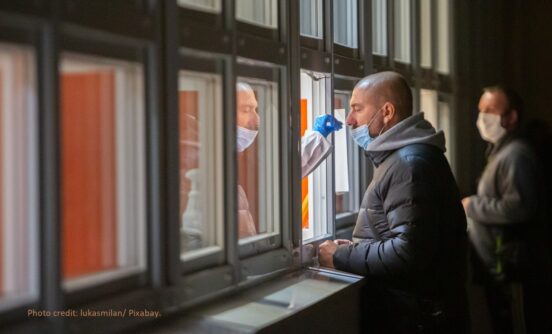The greatest danger to any vaccine rollout is that the same shortcomings resurface.
With so much attention focused on the threat from anti-vaxxer conspiracy theories, the risk is that more prosaic, and potentially more easily addressed, reasons people don’t get vaccinated are ignored.
The burden that Covid-19 testing is placing on the public is unprecedented, and there is much we can learn from our recent experiences. For the first time in medical history, individuals are being expected to interpret symptoms and determine whether a test is needed – judgements that are traditionally made by a clinician.
Moral dilemma about a ‘continuous’ cough
People are being asked to book their own test on a website that repeatedly freezes, or sends them to a test centre more than 100 miles away. They are being counted upon to extract swab samples from their own throats and nasal passages, or from those of their children – a procedure for which they receive no training and which, sometimes, they experience as traumatic.
And it doesn’t stop there. They are then expected to put their life on hold while they await results and to self-isolate for even longer in the case of a positive result, often at great personal and economic cost.
Along the way, people must navigate multiple uncertainties and moral dilemmas: When is a cough ‘continuous’? Should a child who develops a fever after routine vaccination get tested? Can travel guidelines be broken to enable someone to reach an allocated testing centre? Should a scared child be forced to be tested? Can a negative test result be trusted when the sample extraction didn’t ‘feel right’? Should a child with a positive result be sent to an ex-partner who has shared custody, but whom you do not trust to self-isolate?
At every stage in the testing process, vital clinical, logistical, and administrative work must be undertaken by the person seeking a test. The emotional, economic and social toll of testing can also be substantial. But guidelines and advice frequently present testing as straightforward and fail to appreciate the burden of work placed on members of the public.
Uncertainty that undermines public trust
Research that my colleagues and I have carried out on public perceptions, expectations and experiences of Covid-19 testing in Edinburgh and the Lothians has been enlightening. It shows that people are overwhelmingly willing to contribute to a society-wide effort to curb the spread of the virus.
People put a value on testing not only for its public health benefits, but also for the reassurance it can provide and the intimacy with friends and loved ones it can permit. But the everyday obstacles that people encounter in their attempts to comply with testing guidelines are many.
It could be the difficulty matching actual symptoms to the testing criteria, the challenge of organising transport to a testing centre, the uncertainty over whether they took a sample properly, or the social and economic toll of self-isolation. All can lead to the perception that guidelines are impossible to follow and undermine trust in the government’s response.
Our research shows that more needs to be done to cater for real-life circumstances and to show appreciation for the contribution that people are making to a society-wide effort. This might include better guidance for interpreting symptoms; better information materials to prepare people for a physically invasive testing process, especially in the case of small children; more convenient walk-in testing centres, particularly in areas where car ownership is low; and enhanced economic support packages for self-isolation.
Ensuring a successful vaccination system
Acknowledging that some of the things people are being asked to do might be difficult can also go a long way to ensuring that they feel their circumstances are being understood. Even small inconveniences and discomforts can feed uncertainty and weaken trust that the government is in touch with the realities of life under a pandemic.
In response to reports of positive results from vaccine trials, the Scottish and UK governments are gearing up for a rapid, mass vaccination programme. Testing will still be important because the vaccine rollout will be gradual and coverage will never be universal. But it is also essential that the lessons learnt from Trace and Protect are not lost.
Much has been made of the anti-vaxxer threat, but it doesn’t take vehement belief in conspiracy theories to miss a vaccination appointment. It is possible that the greater risk comes from far more mundane challenges, such as how to take time off work to get vaccinated, how to rebook a missed appointment, or hesitance about the safety of a rapidly developed novel medical product.
Simply telling people they ‘should’ get a vaccine without acknowledging these obstacles and uncertainties is likely to be as successful as telling people they ‘should’ test and self-isolate without providing the support to do so.
Our research has taught us that most people want to do the right thing and value the social solidarity that comes from a collective pandemic response. This ought to provide the foundation for a hugely successful testing and vaccination system.
For this to be possible, people have to be trustful of those in government. But it also depends on governments trusting that people are doing their best, and that when they fail to ‘comply’ with guidelines and expectations, there just might be reasonable grounds.
Understanding and addressing what those ‘reasonable grounds’ might be will be crucial to this next stage of the pandemic response.
First published in The Scotsman on 24th November 2020
Dr Alice Street is an expert in diagnostic devices, based at the University of Edinburgh. A study of public perceptions of Covid-19 testing in the Lothians – by Alice Street, Shona Lee and Imogen Bevan – has just been completed.





Comments by Hashemi